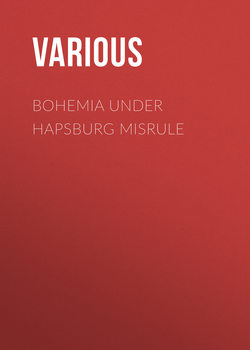Bohemia under Hapsburg Misrule

Реклама. ООО «ЛитРес», ИНН: 7719571260.
Оглавление
Various. Bohemia under Hapsburg Misrule
I. HAVE THE BOHEMIANS A PLACE IN THE SUN?
II. THE SLOVAKS OF HUNGARY
III. WHY BOHEMIA DESERVES FREEDOM
IV. THE BOHEMIAN CHARACTER
V. PLACE OF BOHEMIA IN THE CREATIVE ARTS
VI. THE BOHEMIANS AND THE SLAVIC REGENERATION
ADDENDA. THE BOHEMIANS AS IMMIGRANTS
Отрывок из книги
The object of this volume is to make Bohemia and her people better known to the English-speaking world. The average Englishman’s and American’s knowledge of Bohemia is very vague. It is only within recent years that Anglo-American writers have begun to take a deeper interest in her people. Among the more prominent students of Bohemian contemporary life should be mentioned: Will S. Monroe, Emily G. Balch, and Herbert Adolphus Miller, in the United States; and A. R. Colquhoun, Richard J. Kelly, F. P. Marchant, James Baker, Wickham H. Steed, Charles Edmund Maurice, W. R. Morfill, and R. W. Seton-Watson in England. Count Lützow has written in English a number of works on Bohemian matters.
While it is yet too early to foresee the precise results of the Great War, one may judge of coming events by the shadows they cast before them. A close observer of the Austrian shadows is justified in thinking that the Bohemian people, so long suppressed, stand on the threshold of a new destiny. This destiny points to the restoration of their ancient freedom. If the Allies win – and every loyal son of the Land of Hus fervently wishes that their arms might prevail, notwithstanding the fact that Bohemian soldiers are constrained to fight for the cause of the two Kaisers – Bohemia is certain to re-enter the family of self-governing European nations. The proclamation which the Russian Generalissimo addressed to the Poles may be said to apply with equal force to the Bohemians: “The hour has sounded when the sacred dream of your fathers may be realized… Bohemia will be born again, free in her religion, her language, and autonomous… The dawn of a new life begins for you… In this glorious dawn is seen the sign of the cross, the symbol of suffering and the resurrection of a people.”
.....
Under the “Amended Statute” the kingdom, heretofore free to elect its sovereign, was declared to be an hereditary possession, both in the male and female line, of the Hapsburg family. The three estates – lords, knights, and the cities – which till then constituted the legislative branch of the government, were augmented by a fourth unit, the clergy. The fourth estate was destined to exercise, as subsequent events have shown, the greatest influence on the affairs of the government. The Diet at Prague was divested practically of all its power and initiative; from now on its sole function was to levy and collect taxes. And because the king had invited to the country so many alien nobles (or commoners later ennobled) who were ignorant of the language of the land, the amended statute provided that henceforth the German language should enjoy equal rights with the Bohemian. A disastrous blow to the unity of the Bohemian Crown was further dealt by the annulment of the right of the estates in Bohemia, Moravia, and Silesia to meet at a General Assembly for the purpose of deliberating on matters common to the crown. By this clever stroke the emperor tore asunder the ancient ties of the kingdom. He rightly reasoned that by isolating each of the integral parts of the kingdom he could easier hope to hold in leash the whole of it.
In time the administration of the Bohemian Crown was entrusted to an executive who received the title of Chancellor, and when the kings no longer resided in Prague, having taken up a permanent abode in Vienna, the Chancellory was removed thither, ostensibly on the ground that the Chancellor was required to be near the person of the sovereign. In reality, however, the transfer was a part of a preconceived plan to make Vienna the centre of the empire, from which the Hapsburg “provinces” were to be ruled. Under one pretext or another the Chancellory was being gradually shorn of its powers, until Maria Theresa (1740-1780) abolished it altogether. Henceforth even purely local matters were administered from Vienna direct, and the officials began to style the once proud kingdom a “province of Austria.” During the Thirty Years’ War thousands of villages were destroyed by fire and many of them have never been rebuilt. The population, which before the war was estimated at 3,000,000, was reduced by fire, sword, and pestilence to about 800,000. Fields lay fallow for years for lack of workers to cultivate them. Of the 151,000 farms before the war hardly 50,000 remained. Native nobility was reduced to beggary by the confiscation of their estates, and the peasantry that survived was reduced by alien lords to a degrading condition of serfdom. Between 1621 and 1630 400 Prague citizens went into exile. The Nové Město (one of the Prague quarters) alone had at one time 500 vacant houses. The town of Žatec, which in 1618 had 460 citizens, counted ten years later 205 of them. In Kutná Hora, of a total of 600 houses, 200 remained without owners or tenants. The population of the city of Olomouc in Moravia, by 1640, was reduced from 30,000 to 1,670. Wherever the armies marched nothing was seen but waste and ruins. According to notes taken by Swedish soldiers, 138 cities and 2,171 villages were totally ravaged by fire. The textile industry, which had been the source of the wealth of the country, was almost wholly destroyed by the war.
.....